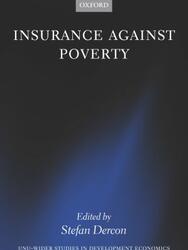Book
Insurance Against Poverty
Poor people in developing countries are often affected by droughts, floods, illness, crop failure, job loss, and economic downturns. Much of their energy goes into coping with these shocks and into day-to-day survival. While insurance and credit markets, combined with widespread social security, provide an important cushion against poverty in rich countries, the need for immediate survival may lock the poor into persistent poverty in developing countries. The poor in developing countries do have informal mechanisms to cope with risk and misfortune. These are based on income diversification, risk avoidance, self-insurance by saving together with family, and community-based mutual assistance. Nevertheless, the scope of these mechanisms remains limited. Repeated individual-specific shocks such as illness or pests, or covariate risks associated with drought, flood, or recession, undermine the ability of individuals and their families to cope with risk.
 Join the network
Join the network